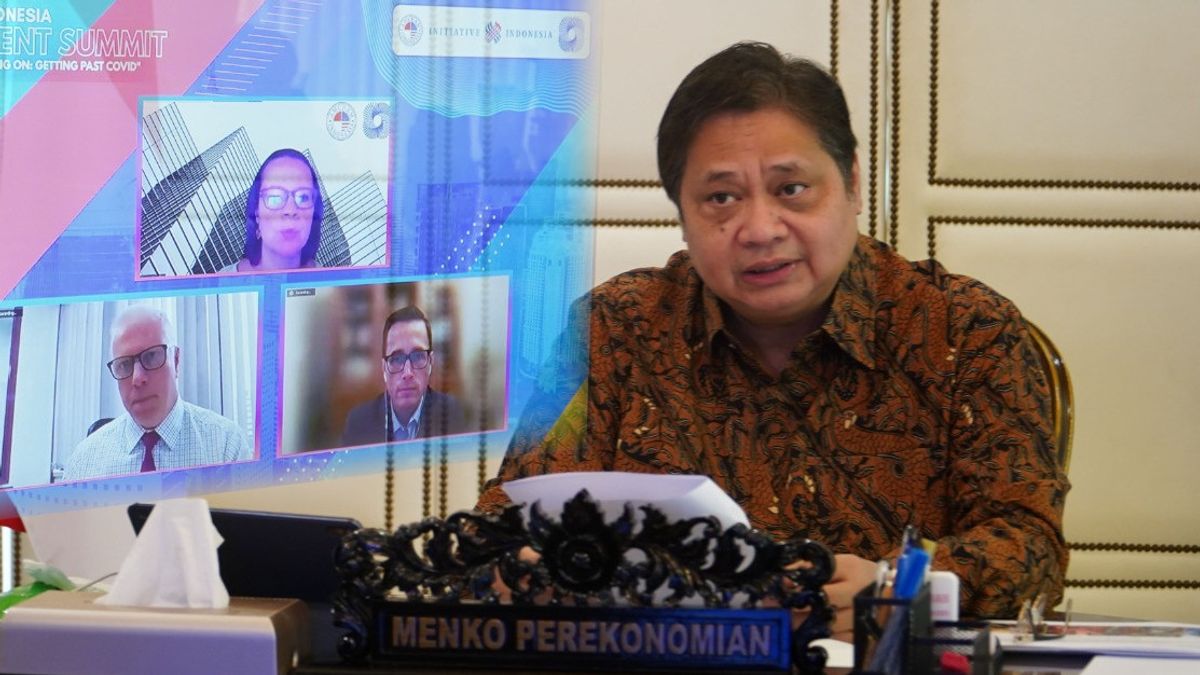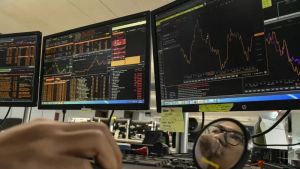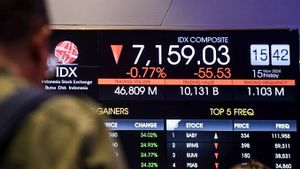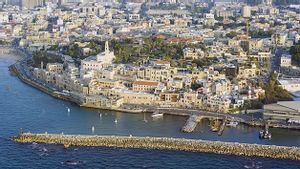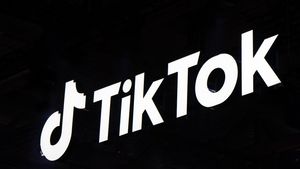JAKARTA - The controlled pandemic condition in Indonesia has brought optimism and confidence to the public and the business world. The economic recovery, which had slowed down in the third quarter of 2021 due to the delta wave, managed to show improvement in the fourth quarter of 2021.
"Various main economic indicators show a positive trend. The consumer confidence index in October 2021 reached 118.5 which indicates a recovery in confidence on the demand side. The Manufacturing PMI reached 53.9, also showing improvement on the supply side," said Coordinating Minister for the Economy Airlangga Hartarto when delivering the Keynote Address at the US-Indonesia Investment Summit 2021 virtually, Monday 13 December.
Various leading indicators of the external sector show good resilience until the end of November 2021. This can be seen in the relatively stable position of Indonesia's Foreign Exchange Reserves and Trade Balance, which has increased since 2019, while the Composite Stock Price Index and exchange rates have fluctuating trends but are still showing improvement.
The success of the Indonesian government in suppressing positive cases of COVID-19 has provided flexibility for community mobility. In addition, the growth of middle class savings has also begun to decline, so it is estimated that public consumption will increase.
This improvement provides optimism that Indonesia's economic growth in the fourth quarter of 2021 can reach more than 5 percent and achieve sustainable economic growth in the future. In 2022, Indonesia's economic growth projection is estimated to reach 5.2 percent.
Positive growth in the information and communication sector was triggered by a shift in people's behavior which tends to have a high level of technology utilization during the COVID-19 pandemic. This shift in behavior certainly has an impact on various aspects of supporting economic activities in daily life. This is an advantage to accelerate digital transformation so that it can make a positive contribution to accelerating economic recovery.
The productive age population in Indonesia has a high level of digital adoption. Almost the entire population of Indonesia is a user of the internet, mobile phones, and social media. Around 37 percent of new digital economy consumers emerged during the COVID-19 pandemic and 93 percent of them will continue to use digital economy products after the COVID-19 pandemic.
In line with this, the digital economy in Indonesia also continues to increase. In 2020, as much as 41.9 percent of the total ASEAN digital economy transactions came from Indonesia, which was contributed by the e-commerce sector. Indonesia's total digital economy transactions have reached 44 billion US dollars in 2020 and are predicted to increase to 124 billion US dollars by 2025.
On the other hand, the COVID-19 pandemic has also encouraged rapid developments in the edutech and healthtech fields as a result of the application of online-based learning and online health consultations.
E-commerce transactions, digital banking, and electronic money are also predicted to continue to increase this year. The largest increase occurred in e-commerce transactions, namely by 48.4 percent (YoY) in 2021. Electronic money and digital banking are projected to increase by 35.7 percent (YoY) and 30.1 percent (YoY) in 2021.
"This increase in digital transactions has a crucial role and contributes to Indonesia's economic recovery during the COVID-19 pandemic," explained Coordinating Minister Airlangga.
There are several challenges that need to be overcome to create a good digital economy ecosystem. The 2020 Indonesia Global Innovation Index shows Indonesia's position is ranked 85 out of 131 countries. Meanwhile, the 2020 Indonesian Digital Literacy Index is on the "Medium" scale.
Coordinating Minister Airlangga revealed that this situation required a new breakthrough. Digital infrastructure development, human resource development, and regulation are the main keys in realizing a digital economy ecosystem that supports economic recovery in various sectors, including the financial sector.
Regarding human resources, the Government will encourage the development of digital talent. The basic skills program to advance digital skills will help digital talent match the needs of the company. Digital talent will increase company productivity in all sectors, including the digital finance sector.
Especially for MSMEs, the Government of Indonesia will encourage the MSME digitization program as part of empowering MSMEs. Various supports have been given to MSMEs as additional motivation to go digital. This effort is expected to increase the productivity of MSMEs and encourage collaboration with business actors in the digital finance sector.
The Indonesian government is also building a digital industry ecosystem, including through the Indonesian Digital Industry Center 4.0 (PIDI 4.0). Here a digital system is applied from the MSME level to the industry to bring economic benefits in digital transformation, including the application of technology that supports environmentally friendly industries.
"In closing, I would like to emphasize that efforts to restore our national economy need to be carried out with continuous collaboration between the private sector and the government, including in obtaining international support," concluded Coordinating Minister Airlangga.
The English, Chinese, Japanese, Arabic, and French versions are automatically generated by the AI. So there may still be inaccuracies in translating, please always see Indonesian as our main language. (system supported by DigitalSiber.id)
